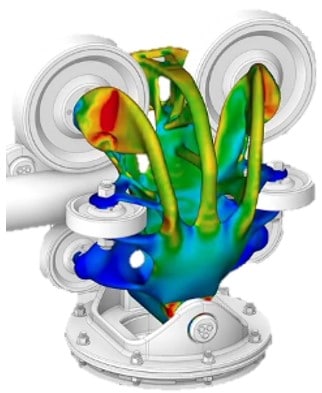Ansys Discovery | 3D Engineering Design Software
Allow design engineers to explore ideas, iterate, and innovate with unprecedented speed.
Allow design engineers to explore ideas, iterate, and innovate with unprecedented speed.
Ansys Discovery introduces a cutting-edge design tool that seamlessly blends physics simulation, high-fidelity simulation, and interactive geometry modeling into a unified and user-friendly experience. With Ansys Discovery, engineers can delve deeper into their design’s details, refine concepts, and introduce multiple physics simulations to better account for real-world conditions.
Ansys Discovery provides engineers the opportunity to respond to important design concerns earlier in the design process by fusing interactive modeling and numerous simulation capabilities in a first-of-its-kind tool.
With this upfront simulation strategy, users can explore several design concepts in real time without having to wait for the simulation results, saving time and effort on prototyping.

The ability to evaluate more concepts and rapidly gauge design performance through virtual design testing ultimately helps accelerate the processing of bringing breakthrough new products to market. Ansys 3D Design will help you get there.
See instant stress distribution data regardless of model complexity. Use the Ansys Mechanical solver to simulate nonlinear effects and add local refinement for increased accuracy and control.
Instantly find flow trends, while updating input parameters or making geometry updates, and see Ansys Discovery’s instant feedback of your design’s performance. Use the Ansys Fluent solver for detailed high-fidelity studies of complex geometries and fluid behaviors.
Unlock the potential of generative design utilizing topology optimization including manufacturing constraints and optimization of resonant frequency.
Also known as parameter sweeps, these design point studies create a Pareto frontier of data in Ansys Discovery that let you explore many design possibilities by varying multiple geometric or simulation parameters in an automated fashion.
Discovery’s modeling technology and versatile toolset enables you to easily create and modify imported geometry without the complexity associated with traditional CAD systems. Full modeling capabilities allow users to prep models for any type of simulation or make edit models to optimize your simulation.
Observe different modes of vibration, make changes to geometry, and instantly evaluate performance. Instantly evaluate how changes to thermal inputs, materials and cooling conditions will affect the thermal performance of your design.